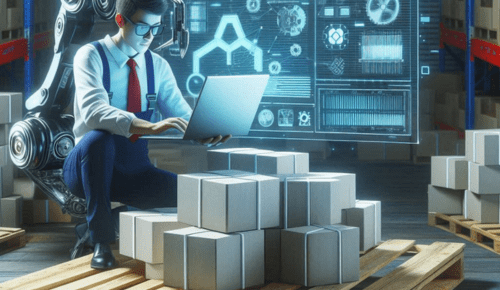To fully harness the potential of generative AI in logistics, companies must invest in training and skill development for their workforce. One essential skill is data literacy, as working with generative AI requires understanding and interpreting complex datasets. Employees should be trained to analyze data effectively, identify trends, and draw actionable insights. This skill is critical for making informed decisions that drive supply chain optimization.
Moreover, proficiency in AI technologies and tools is crucial for professionals in the logistics sector. Familiarity with machine learning algorithms, data modeling, and AI platforms enables employees to implement and manage AI-driven solutions effectively. Companies should offer training programs and workshops to keep their workforce up-to-date with the latest advancements in AI technology, ensuring they can leverage these tools to their fullest potential.
Additionally, developing problem-solving and critical thinking skills is essential for leveraging generative AI in logistics. AI can provide valuable insights, but it is up to humans to interpret these insights and make strategic decisions. Training programs should focus on enhancing employees’ ability to approach challenges creatively and devise innovative solutions. By fostering a culture of continuous learning and skill development, companies can empower their workforce to embrace generative AI and drive supply chain transformation.
Tools and Technologies for Integrating Generative AI in Supply Chain
Integrating generative ai for supply chain requires a robust technological infrastructure and a suite of specialized tools. One fundamental technology is cloud computing, which provides the scalable computing power and storage capacity needed to handle large datasets and execute complex AI algorithms. Cloud platforms, such as Amazon Web Services (AWS) and Microsoft Azure, offer a range of AI services, enabling companies to deploy and manage AI applications seamlessly.
Machine learning frameworks, such as TensorFlow and PyTorch, are essential tools for developing and training AI models. These frameworks provide a variety of algorithms and libraries that facilitate the creation of custom AI solutions tailored to specific supply chain challenges. Additionally, AI-powered analytics platforms, like Tableau and Power BI, allow companies to visualize data and gain actionable insights, supporting data-driven decision-making across the supply chain.
Furthermore, advanced software solutions, such as AI-driven inventory management systems and transportation management systems (TMS), are critical for optimizing logistics operations. These solutions leverage AI to automate processes, enhance accuracy, and improve efficiency. By integrating these tools and technologies, companies can create a cohesive AI-driven supply chain ecosystem that enhances performance and competitiveness.
Conclusion: Embracing Generative AI for a Competitive Supply Chain Advantage
In conclusion, the integration of generative AI into supply chain management offers a transformative opportunity for businesses seeking to optimize their logistics operations. By enhancing demand forecasting, streamlining logistics processes, and enabling real-time decision-making, AI provides a significant competitive advantage. As future trends indicate, the role of AI in supply chain optimization will continue to grow, driven by advancements in IoT, blockchain, and sustainability initiatives.
To capitalize on these opportunities, companies must invest in training and upskilling their workforce, ensuring they have the necessary expertise to leverage AI technologies effectively. By adopting the right tools and technologies, businesses can create an AI-driven supply chain ecosystem that enhances performance, reduces costs, and fosters sustainability.
As the logistics industry continues to evolve, embracing generative AI is essential for maintaining a competitive edge. Companies are encouraged to explore AI solutions tailored to their specific needs and integrate them into their supply chain strategy. By doing so, they can unlock new levels of efficiency, agility, and innovation, positioning themselves for success in the dynamic world of logistics.
Explore how generative AI can transform your supply chain operations today. Contact our team of experts to learn more about tailored AI solutions that can enhance your logistics processes and drive your business forward. Don’t miss out on the opportunity to gain a competitive edge in the ever-evolving logistics landscape. Reach out now to start your AI journey!




